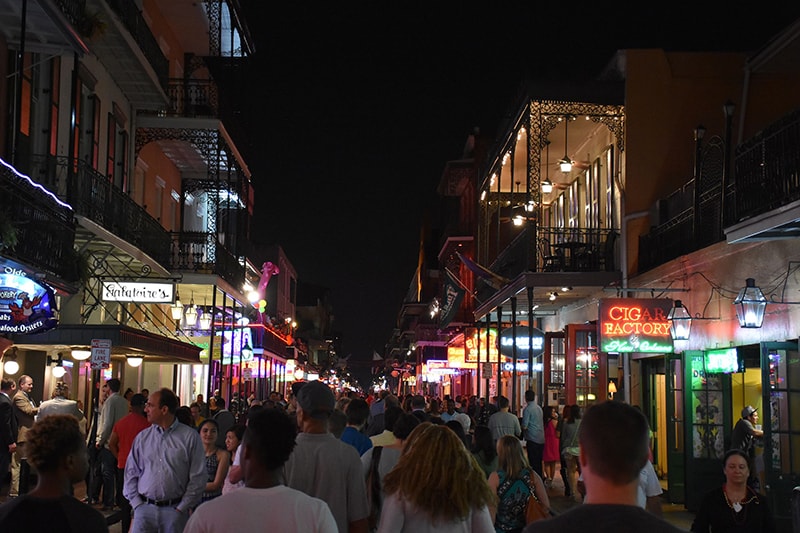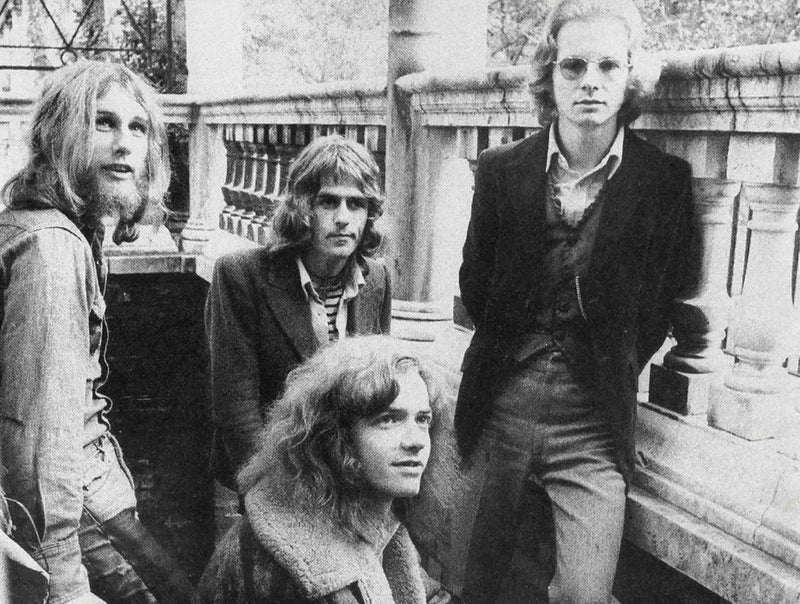Landing in Baton Rouge, Louisiana was a curious relief. It had been a weird, stressful day of flying. Our initial flight to St. Louis had been delayed, and subsequently, it looked like we were probably going to miss our connecting flight from St. Louis to Baton Rouge. We had a concert in Baton Rouge that night. Making matters worse was that it was the only remaining flight for the day. Given that detail, missing that flight was going to be a real problem. I could not see a solution. Driving would not work; it was almost seven hundred miles from St. Louis.
Upon landing in St. Louis airport, I was acutely aware that we had four minutes before our connecting flight was scheduled to take off. We had to try, so we ran as fast as we could down the long corridor toward the main terminal. Moving as fast as we could, I still could not help but notice how people were dressed in their Sunday best, go to church clothes. I saw women in fancy lacy dresses, the type that would be worn at a wedding. Men were wearing their best suits. Certainly not the kinds of clothing comfortable enough to wear while flying.
Still, for most people, flying was not a common occurrence in the earlier part of the 1970s, when flying was more expensive than it is now. But flying was fun and the airlines treated you well. Most people considered flying an event, so understandably, many folks put on their fancy garb.
As we arrived at Terminal 2 and the B Gates, we saw that our gate was all the way down near the end of the concourse. The band and I were still running and as we got closer to B-22, I saw people milling around. It looked like the flight did not board, as I slowed down and tried to catch my breath.
Still breathing hard, I got to the boarding desk. I asked the gate attendant what the delay was, and she answered that there was a bomb threat. She told me that all such threats had to be taken seriously and the plane had to be searched and cleared before resuming service. If all was good, we were looking at an approximately two-hour delay. That did not make sense, I thought to myself. This was a short-hop flight, almost a commuter flight. Why would anyone call in a bomb threat on such an obscure flight, out of the tens of thousands of flights daily? A couple of hours later the plane was cleared; nothing was found, and we all boarded.
That was certainly strange. In the 1960s and ’70s there were some hijackings, with the hijackers commandeering commercial airplanes and forcing the planes to fly to Cuba (along with all the passengers). Seemed dramatic, but then again, there were no flights from the states to Cuba. Remember this was way before terrorism became more of a concern, and today’s heavy security. Back then the cockpit doors were about as sturdy as a fortified screen door.
So, none of us were particularly worried. We figured it was because of someone irrational or a jealous ex-spouse who wanted to mess with their partner. It was surprising, but we were not concerned, and actually secretly pleased that we did not miss our flight to the gig.
Upon landing we disembarked and walked down to baggage claim. We saw a limo driver holding a sign for Wishbone Ash. Identifying ourselves, we walked out of the terminal into a warm southern winter day, a soothing respite from the chilly winter up north. Wishbone Ash, still active today, are a British hard-rock band known for their twin-guitar harmonies.
Andy Powell, lead singer and guitarist for Wishbone Ash, got into the limo and asked, “where is the radio?” as he looked over the interior of the stretch Cadillac limousine. “Ken,” he asked me, “what kind of limo does not have a radio?” Just like that it hit me. “A limousine owned by a funeral parlor,” I answered. You should have seen the looks on their faces.
One of the joys for a touring band is hearing their record played on the local FM radio. Whenever we came into a new city where we were doing a concert, we would listen for airplay. It gave the band a nice warm feeling to hear their music on a local radio station. A local promoter with juice could make that happen by advertising the concert on the station. Most of the stations would throw in some airplay as a bonus to the paid spots the promoter had purchased. Secondly, it put the band in a good mood, and that was desirable as things always went better when the band was happy.
Next up after the Baton Rouge gig was Tulane University in New Orleans. When we played a college date, the school’s radio station did the promotion and plugged the group’s records. With college gigs, ticket sales were never an issue because of the built-in audience. The concert committee had booked the band into their field house (approximate capacity 8,000) and also procured us rooms right on Bourbon Street, off Toulouse Street. The hotel was in an old building most likely built just after the Civil War. It was in great shape; rustic, but not shabby in any way. I was on the second floor, and my room faced out to Bourbon Street, with a little balcony. What a great room! I stood out there on the little balcony with a beer and watched the afternoon below me on Bourbon Street getting more crowded as the evening drew near. The street was turning into a party.
After the concert the band was in a good mood. The show went well, and the audience loved it. At that point in time, they were headliners playing big venues and coliseums. When I got back to my room, I could not help but notice how noisy the celebration on Bourbon Street had gotten. For some reason it seemed appropriate and fitting. Some of us went downstairs and had a drink.
 Bourbon Street, New Orleans, Louisiana, at night. Courtesy of Wikimedia Commons/MusikAnimal.
Bourbon Street, New Orleans, Louisiana, at night. Courtesy of Wikimedia Commons/MusikAnimal.
Wishbone Ash were playing two nights at Tulane and on the second day some of the students from the concert committee took us over to a modern office building facing the Mississippi River. They had made arrangements for us to have access to the roof. We were about 35 stories up with a splendid view southward toward the Gulf. It was a clear and sunny day with great visibility. Someone from the building pointed out the sights. It was an impressive perspective. If you are playing college dates and have some extra time, many concert committees will plan fun things to do.
With New Orleans behind us we headed to Hollywood, Florida for the tour’s final date. Staying at a Holiday Inn across from the beach, we were joined by the band’s booking agent, Richard Hallem (from Creative Management Associates) and Ian Copeland (of BTM, British Talent Management), who had come down from New York. The concert was held in the Hollywood Sportatorium, a big arena, nicknamed the Sporto. It was a multi-use facility for concerts, boxing events, NWA wrestling (with stars like the 7-foot-four, 450-pound André the Giant), state fairs, and rodeos, and it smelled somewhat musty. I had worked a concert in a similar venue when I was with the Jesus Christ, Superstar roadshow (see my article in Issue 137). That was in Lubbock, Texas, and that place also smelled like a rodeo. Still, the Sporto was a viable concert site.
 Hollywood Sportatorium, Pembroke Pines (originally Hollywood), Florida.
Hollywood Sportatorium, Pembroke Pines (originally Hollywood), Florida.
Here’s a quote from Suzzy Sporto, from hollywoodsportatorium.com: “Rock’s worst venue? The Hollywood Sportatorium was Broward County’s ‘premiere’ rock mecca for 20 years. It leaked, it rattled, it was a dump…and I am shocked it did not sink in the muck….but the parking lot hosted some of the greatest parties of the ’70s and ’80s.”
After the sound check, we decided to stay at the hall because the hotel was a 30-minute drive away, and we had an early show at 8 o’clock. Richard, Ian, the promoter and I were standing together when Richard pulled out a joint and lit it. I was flabbergasted and sputtered to Richard, “what the hell are you doing? Do you want to get arrested?” He just looked at me and smiled.
A deputy sheriff who was on security for the concert was walking nearby and heard me. He turned and looked at us and then walked over. He said to Richard, “put that out,” and Richard said something snarky back to him. The deputy replied to Richard, “you are under arrest.” What was he thinking? We could not believe it, and Richard, for maybe the first time ever, was speechless. After a moment everyone started talking at the same time. Voices were getting louder, and then a more senior deputy came over. He turned to the younger deputy and said, “what are you doing?” The younger one replied, “he has a marijuana joint, and he lit it up.” The senior deputy answered, “we are hired as private security for the concert and these people are the ones that are paying.” The senior deputy put his hand on the younger deputy’s arm and said, “go over to the entrance and find the officer of the day for your assignment.” Without saying anything more, the younger deputy nodded his head and walked away.
The remaining deputy said to Richard, “do me a favor, do that in the dressing room or at the very least someplace more discreet.” Jeez, I thought, what the hell was Richard thinking? So, the show went on and the lights and sound were fine.
That night after the concert we were back at the hotel for an impromptu end-of-tour party. Everyone got ripped. Ian started to get upset – he was having flashbacks. He had just gotten back from Vietnam and discharged from the service. He had seen action and had performed bravely, and was awarded the Bronze Star for valor.
Now he was back Stateside and was attempting to deal with re-entry and culture shock. Such a sudden reversal in one’s reality – from being a soldier in a humid, remote and dangerous country to the safety of the United States. One day you were in Vietnam and the next day you were Stateside. Just a long airplane ride was all it took.
A couple of weeks later I was at home when Richard Hallem called. He said, “I just got off the phone with the FBI. They were calling about the bomb threat in Saint Louis.” Well, this must be true, I thought to myself, because how else would he know about it? The band was back in England, and I had never mentioned what had happened to anyone. In fact, I had not given one thought to the incident once it was over.
“What did they want?” I asked. Richard replied, “they wanted to know if you were someone that might have called in a bomb threat to delay the connecting flight. They understood that missing the connection was not a good thing for Wishbone Ash, so they were suspicious of you, the tour manager.” “You told them I would not do anything like that, right?” I asked. “No,” Richard said, “I told them it was a possibility.” At that moment I nearly soiled my trousers.
Header image: Wishbone Ash promo photo, 1970.



